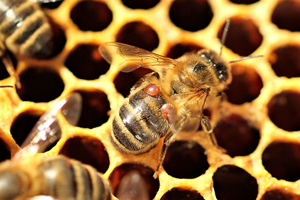A new study shows a connection between low levels of exposure to the neonicotinoid clothianidin and varroa mites in honey bees.
 |
Source: AbsoluteFolly, Flickr |
Honey bees are essential pollinators for many of our crops. Recently, honey bees have been experiencing colony collapses that endanger the future of both the bee itself and the food that relies on their work. Though a majority of colony losses were associated with varroa mites, we now know that neonicotinoids likely are playing a significant role in the effect the mites have on an overall colony. Without exposure to neonicotinoids, the bees would likely be more resistant to parasites and disease.
These insecticides are in common use and chemically related to nicotine. Though they are generally touted as a “safer” option for birds and mammals, they continue to be implicated in harm to beneficial insects. In attempting to protect our crops from insect pests, significant damage to the environment and economy is being done. Organic food is grown without the use of neonicotinoids and often supports beneficial insects, including pollinators.
Neonics hinder bees’ ability to fend off deadly mites
Science Daily
Source: University of Guelph
A University of Guelph study is the first to uncover the impact of neonicotinoid pesticides on honey bees’ ability to groom and rid themselves of deadly mites.
The research comes as Health Canada places new limits on the use of three key neonicotinoids while it decides whether to impose a full phase-out of the chemicals.
Published in the Nature journal Scientific Reports, the study revealed that when honey bees are infected with varroa mites and then regularly exposed to low doses of a commonly used neonicotinoid called clothianidin, their self-grooming behaviour drops off.
Without that self-grooming, bees are susceptible to mites that can also carry viruses that can quickly kill, said lead author Nuria Morfin Ramirez, who completed the research along with Prof. Ernesto Guzman, School of Environmental Sciences, as part of her PhD.
“When bee colonies began to collapse years ago, it became clear there wasn’t just one factor involved, so we were interested in whether there was an interaction between two of the main stressors that affect bees: varroa mites and a neurotoxic insecticide, clothianidin,” said Morfin.
“This is the first study to evaluate the impact on the grooming behaviour of bees.”

